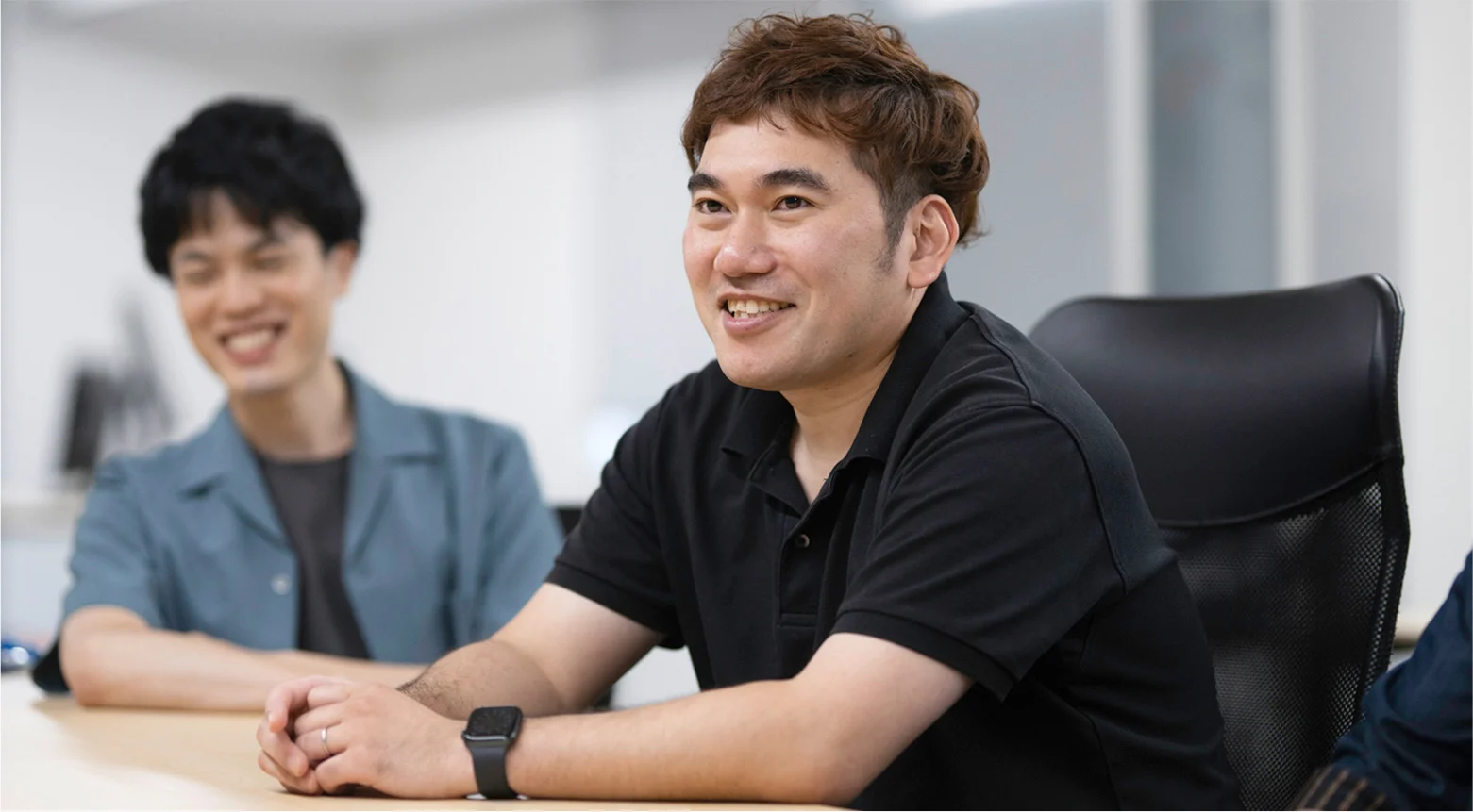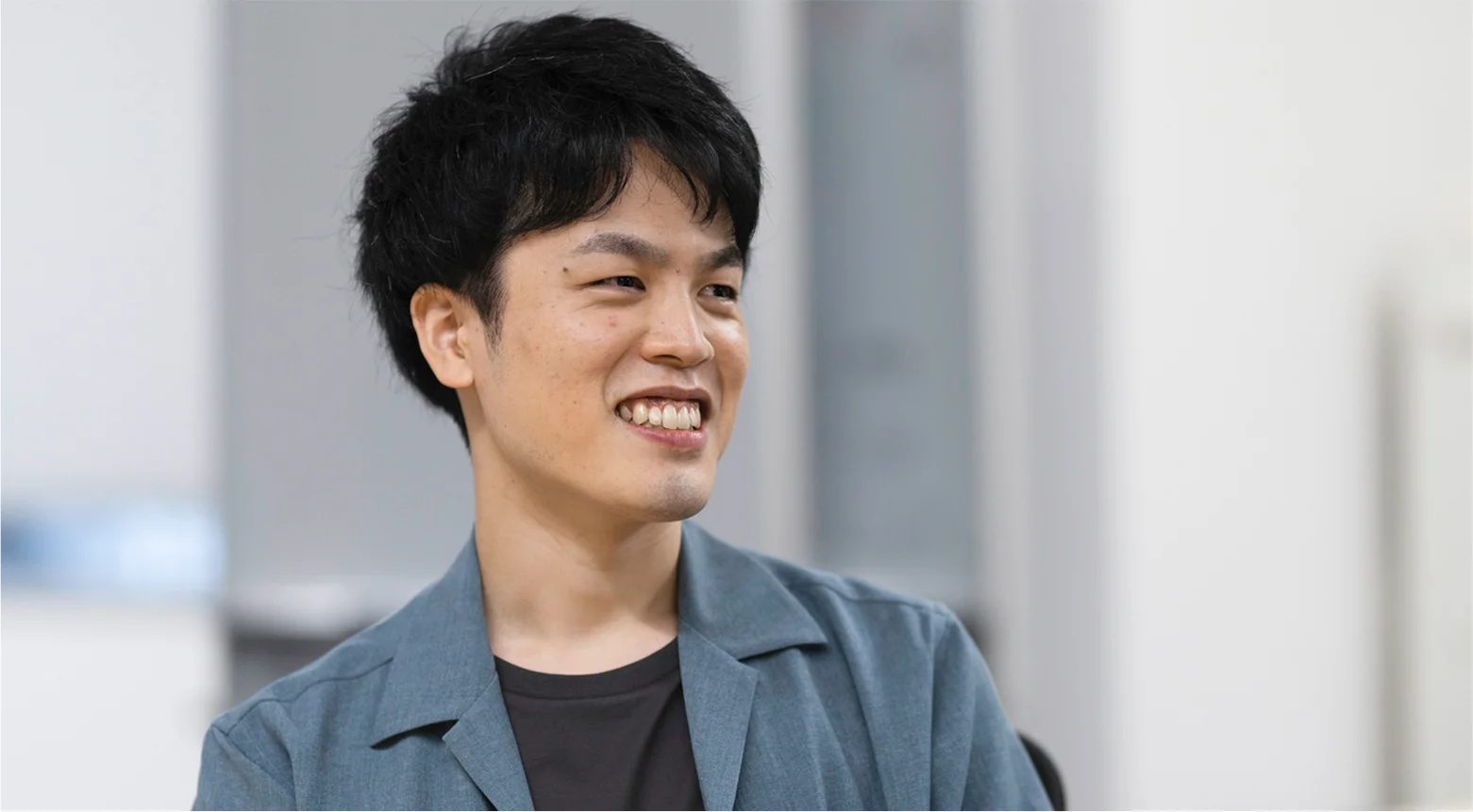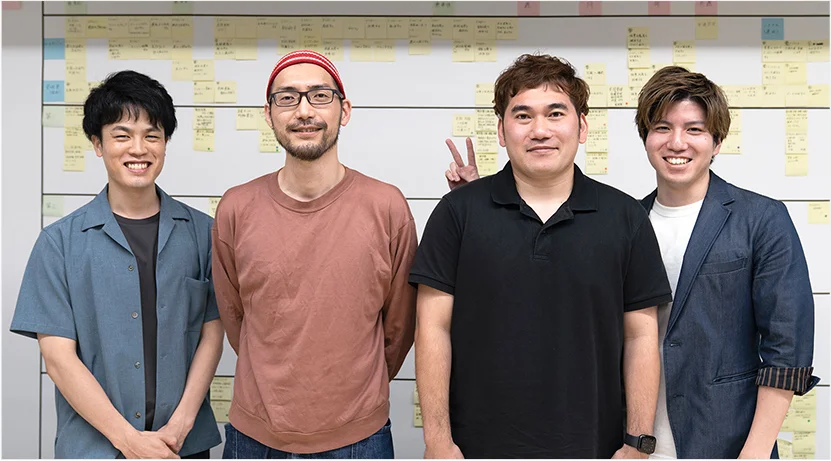

Dec 24, 2021
CAREER & LIFEHelping the whole team grow by leveraging personal strengthsand respecting other members
Cherishing the joy of achieving results through hard work
-

Cloud Services Development Div.
It has the software engineers’ team to develop systems, the business team to plan projects, and other teams. They work together depending on projects, and one of their achievement is “yuriCargo”, the driving scoring app developed in 2020.
Based out of Tokyo, the Cloud Services Development Div. plans and develops mobility-related software services. It devises the way that each member not only does his/her jobs but also enjoys his/her growth with jobs in working together toward the goals of the team. They will talk about their teamwork and how to do their jobs.
Contents of this article
Building the ideal team

Good teams not only produce good results, but also provide their members with pleasure. “Pleasure” here does not mean making everyone’s jobs easy. Rather, it means helping them improve their skills to tackle new things and providing the pleasure of challenging themselves and achieving tangible growth.
All team members are striving to learn new things and improve themselves. They don’t boast about these efforts openly, but after work you will often see them studying new skills they’ll need for the following week’s work.
They improve their skills and themselves because they see other members doing the same things in such a way even if no one tells them to do so.
As each member grows in various ways, the team’s overall abilities and performance are strengthened, and it leads to better results of the team.
However, no one in the team is singled out and forced to learn new skills alone to complete tasks. All of the members are equally focused on improving themselves together.
Giving and receiving help rather than working alone helps the team grow

Tasks are assigned so as to help promote each member.
Projects are divided up into specific tasks, and then members must take them “in order”. This means that, rather than simply they choose the tasks they prefer, they must take tasks in order of the priority.
You have to undertake the assigned work even if you feel it’s impossible with his/her knowledge and skills. You can’t pass it to other members.
You might imagine that this system would stretch people beyond their capabilities, but they usually laugh and get excited when they receive a tough assignment.
It is a challenge to tackle tasks they are not very good at, but it is also the good opportunities to promote themselves.
We support them enough to complete their tasks and they are not left struggling on their own.
My team stay connected to Zoom, and we can ask any questions whenever we have them.
It is taken for granted that we can ask other members for help whenever we are in trouble, and ask any questions whenever we have them.
And in response, other members teach answers and solutions to them, and sometimes additional members are assigned to assist them.
We can solve our problems quicker by creating the environment in which members can ask their questions to any other members in the team than that in which they can do it only to specific members.
Because the entire team supports members in handling tasks, they are able to feel improvement in their skills, and they are also able to handle the similar tasks with confidence when they are assigned to them.
One of the reasons why we adopts this approach is that we cannot function our team well without it.
If only the specific member is able to handle some tasks, he/she cannot take a day off at all and will be overloaded.
And if he/she leaves the team due to personnel changes or career changes and no other members cannot handle his/her tasks, we would never be able to complete his/her projects.
I think it is sound as a team to prevent such troubles.
We make sure that not only each of us improve our own skills, but also we help each other improve them.
Eliminating barriers to communication to make it easy to ask for help

We provide many opportunities for team members to ask questions, and also eliminate the high psychological barrier of asking for help.
You may have experienced that you hesitated to ask questions or were embarrassed by our lack of knowledge when you joined a new team.
If someone of the team have to go out of their way to say you can ask any questions in such a situation, it shows that the atmosphere of the team is “not good”.
It is very difficult for not only new comers but also mid-career or experienced members to say “I don’t know” or “I don’t understand” to other members. To eliminate this psychological barrier, we encourage members to say what they think in daily conversations in the team whether it’s related to their jobs or private lives. This ensures that they feel the atmosphere in the team that they will be accepted by other members even if they don’t say something at high levels, which makes it easier to ask for help when necessary.
Every week members in my team review the week, and talk each other about good things and problems in the week.
We talk about not only our own projects but also other projects, private lives and quite daily topics such as delicious ramen we ate.
Sometimes we’ll just gripe about something, which can lead to small talk on a wide range of topics. When talking with others, it’s best to avoid focusing only on the job you’re currently working on.
We feel safe in our review by proceeding it with some small talks.
We have ever communicated only with voices in web meetings, and actually I meet some members face-to-face for the first time at this interview, but I can talk with them casually as if this is not the first time to see.
Even without meeting in person, our casual conversations have eliminated barriers to communication.
However, despite the good team atmosphere, we sometimes have different opinions on some matters. When an argument becomes heated up, another member suddenly chimes in and says something like “The atmosphere is not good.” to stop the arguing. Then, all of the members write down the contents of the conflicting opinions with charts on a whiteboard and get them straight calmly in order to achieve productive discussion. In this way, we are able to resolve our differences.
If two people with differing opinions continue to stubbornly state their own ideas, we won’t reach a consensus on how to proceed. By adding a third-party perspective and visualizing the ideas, we can be more objective and resolve the conflict.
Conversely, it’s also a problem that opinions don’t clash at all because it means that members are reluctant to say what they think. It is rather good that members express their opinions different from others without denying others’ opinions. As long as they feel a sense of security that someone in their team will organize their opinions calmly and logically even if they make conflict, they will feel free to express their opinions and thoughts.
Respect for others is the vital ingredient for achieving a team where ideas are shared openly

In my team, even if members ask someone for help when they run into troubles in their work, ask trivial questions or expresses different opinions from others, they do not worry about whether they are blamed. That’s because all of us understand the importance of sharing thoughts openly in order to help the team function.
This approach is based on a concept known as HRT, which stands for humility, respect and trust. Each of us respects other team members for the differing qualities and strengths they bring to the table.
Because it is our team’s pleasure that all of our members grow up professionally by supporting each other, we never deny member’s opinions completely, as it inhabits their growth, nor say “Don’t you know about that?” to blame others.
And no one is bossy and tells others to listen to him/her as they are elder than others or as they are in higher positions than others.
Everyone has an equal opportunity to take on new challenges. By working together as a team, we can grow and enjoy ourselves more.
We will always value the pleasure of this approach while developing new DENSO services.
【Afterword】
The Cloud Services Development Div. has cultivated a work environment in which all team members, regardless of age or position, are on equal footing and can share ideas openly.
Although the calm personalities of team members are one reason behind their excellent teamwork, they still have their own personalities.
As one member put it, “Even though some members like to take the lead, they always seek others’ opinions. Additionally, whenever we have the chance to teach someone based on our unique skills or strengths, it’s really rewarding. However, we always show respect to others when doing this.”
Their approach of expressing oneself openly while showing respect for other members is the key to this division’s success in making work fun for the whole team.
REACTION
Changing your "Can'ts" into "Cans"
Where Knowledge and People Gather.




Leave a comment